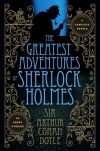This week, I finished the collection of stories called The Memoirs of Sherlock Holmes. I am now halfway through my Sherlock Holmes volume. The Memoirs was published in 1893. There are eleven stories:
- “Silver Blaze”
- “The Yellow Face”
- “The Stockbroker’s Clerk”
- “The Gloria Scott“
- “The Musgrave Ritual”
- “The Reigate Squire”
- “The Crooked Man”
- “The Resident Patient”
- “The Greek Interpreter”
- “The Naval Treaty”
- “The Final Problem”
I am so glad to have a full volume of Sherlock Holmes tales, because “The Final Problem” definitely has a sad ending. If you have ever read anything about Sir Arthur Conan Doyle, you know that he did not like Sherlock Holmes. He intended for Holmes to be wrapped up in one novel, A Study in Scarlet (1886-1887). But audiences loved Holmes, and so for the next several years, Doyle would write another novel, The Sign of the Four, and several short stories that were printed as serials. He never intended for Holmes to become a national hero, preferring to write other novels and full length historical fictions instead. According to the introduction in my volume, Doyle said, “The difficulty of the Holmes work was that every story needed as clear-cut and original a plot as a longish book would do. One cannot without effort spin plots at such a rate. They are apt to become thin or break” (Christopher & Barbara Roden, The Greatest Adventures of Sherlock Holmes, 2009). Doyle decided to kill Holmes off and never write of him again, and he did just that in “The Final Problem”. At Christmastime 1893, readers were shocked as Holmes grappled with his greatest adversary, Professor Moriarty. Both plunged over a cliff to their deaths. With expert care, Doyle, writing as Watson, gave an emotional farewell to the great detective, and that was where The Memoirs of Sherlock Holmes ended.
As I said before, I am so glad to have a complete volume of Holmes, because I can move right to the next story and find that Holmes returns from the cliff. For ten years, Doyle didn’t write any more short stories featuring the great detective. He did write one novel, The Hound of the Baskervilles, in that time period. He offered it to his publishers at two different prices, a lower price without Holmes and a higher price with him. The publishers paid the higher price.
Then, in 1903, Doyle brought Sherlock Holmes back from the dead in “The Empty House”. This was the first of fourteen stories that would be published as The Return of Sherlock Holmes. Doyle offered a very real alternative outcome to the detective’s cliffside death. While he and his adversary had fought, Moriarty had gone over the side while Holmes was able to find shelter on a cliffside ledge. However, he was spotted by Moriarty’s accomplice. Though his new adversary threw boulders at the detective, trying to dislodge him and cause his death, Holmes was able to get away. They would meet again in “The Empty House.”
I am afraid I have given away too many details. I hope I have not ruined the stories for you. I recommend that you find yourself a copy of these stories, maybe even a complete volume like I have. Curl up on a rainy day with a cup of tea and enjoy reading them for yourself. I think you will not be disappointed.

